Abstract
Functional motor control requires perfect matching of the central connections of motoneurons with their peripheral inputs. It is not known, however, to what extent these central circuits are influenced by target muscles, either during development or after a lesion. Surgical interventions aimed at restoring function after peripheral nerve lesions provide an opportunity for studying this interaction in the mature human nervous system. A patient was studied in whom the spinal accessory nerve was anastomosed into a lesioned facial nerve, allowing voluntary contractions of the previously paralysed muscles. This procedure, in addition to replacing the facial neurons at peripheral synapses, allowed a new short latency trigeminospinal accessory reflex of the R1 blink reflex type to be demonstrated, implying that trigeminal neurons had sprouted towards spinal accessory motoneurons over a distance of at least 1 cm. These results show an unexpected influence of the periphery in remodelling central connectivity in humans. The motoneuronal excitability for this R1 reflex response was therefore studied to compare the convergent properties of facial motoneurons (normal side) with those of the spinal accessory motoneurons (operated side) using a classic double shock technique with variable interstimulus intervals (conditioning test stimulus). On the normal side, conditioning stimuli (to the ipsilateral or contralateral infraliminar supraorbital nerve) produced a clearcut facilitation of the R1 blink reflex when the interstimulus interval was 30-80 ms. By contrast, a similar procedure had no effect on the R1 blink reflex mediated via the trigeminal-spinal accessory reflex arc. These data indicate that despite the heterotopic sprouting of some axons from neurons in the XIth nucleus, motoneurons involved in the newly formed reflex arc remain totally inexcitable by other trigeminal afferents and seem unable to ensure a physiological functioning of the normal blink reflex. Thus the functional relevance of the recovered R1 blink response remains unclear.
Full text
PDF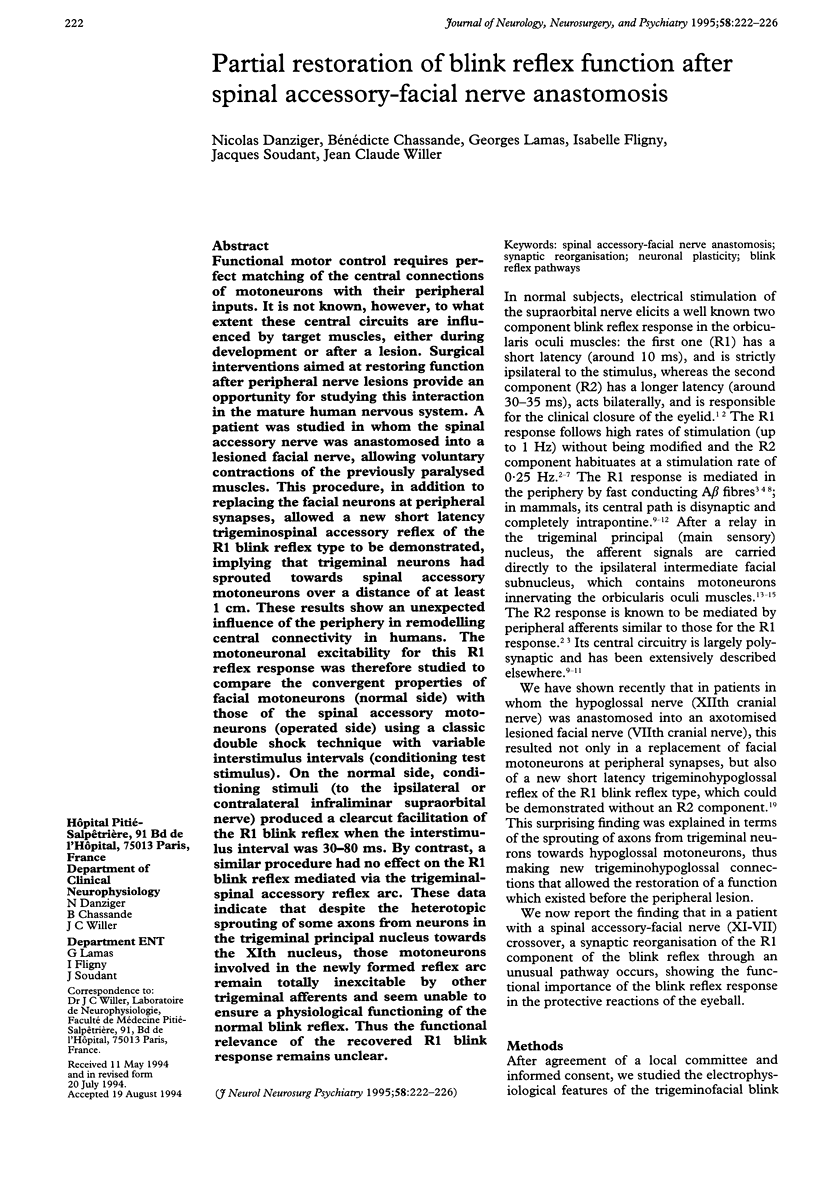
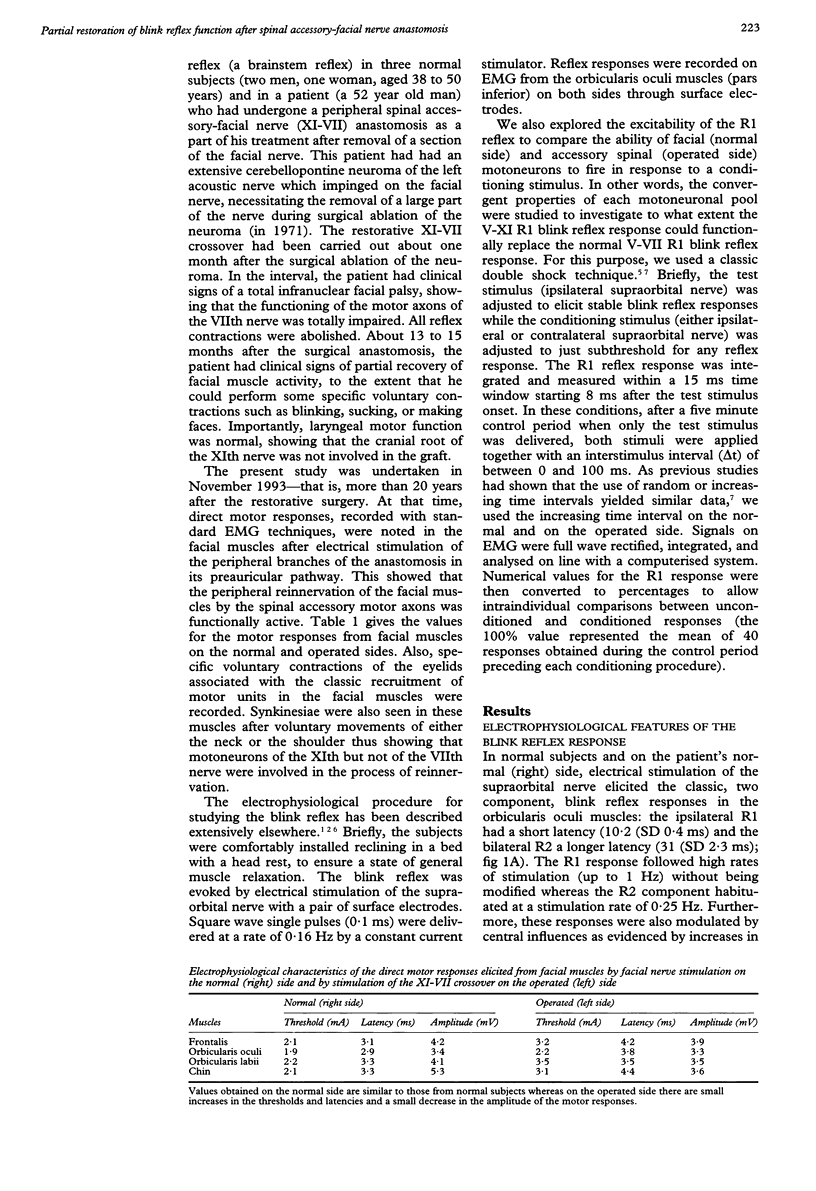
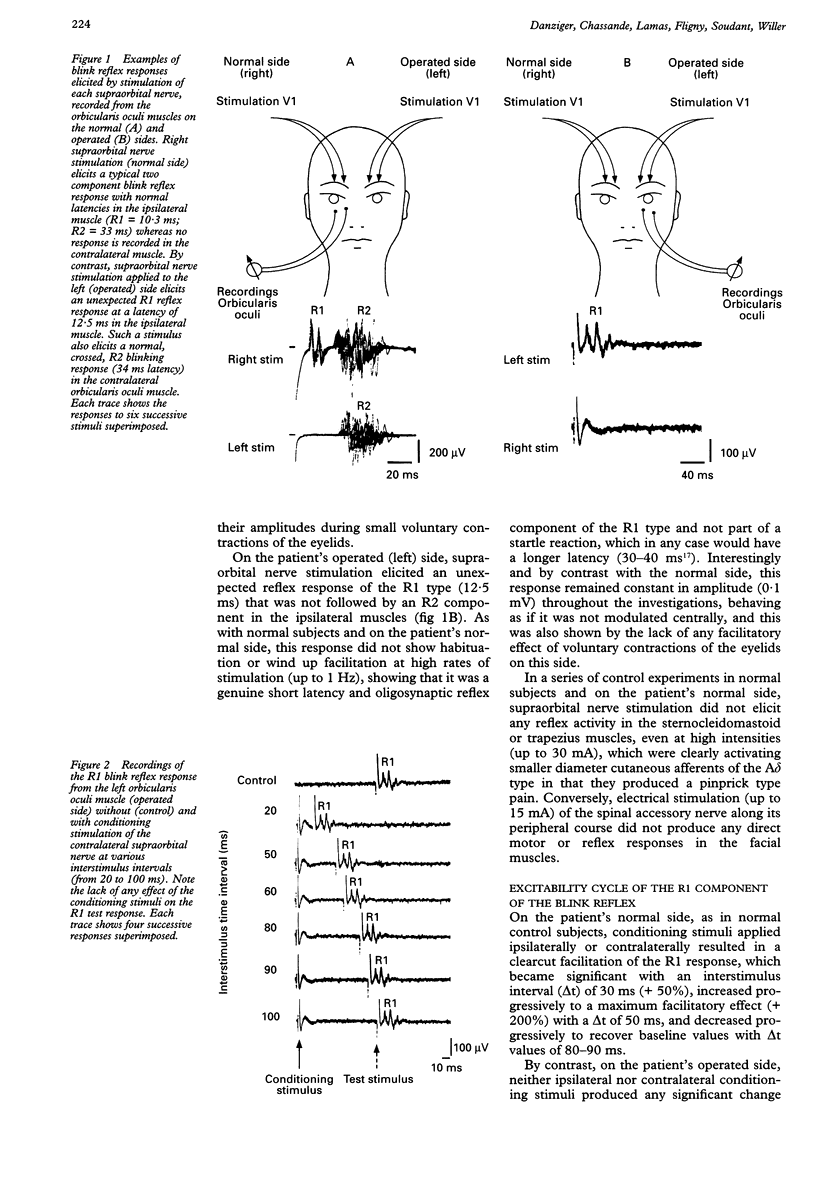
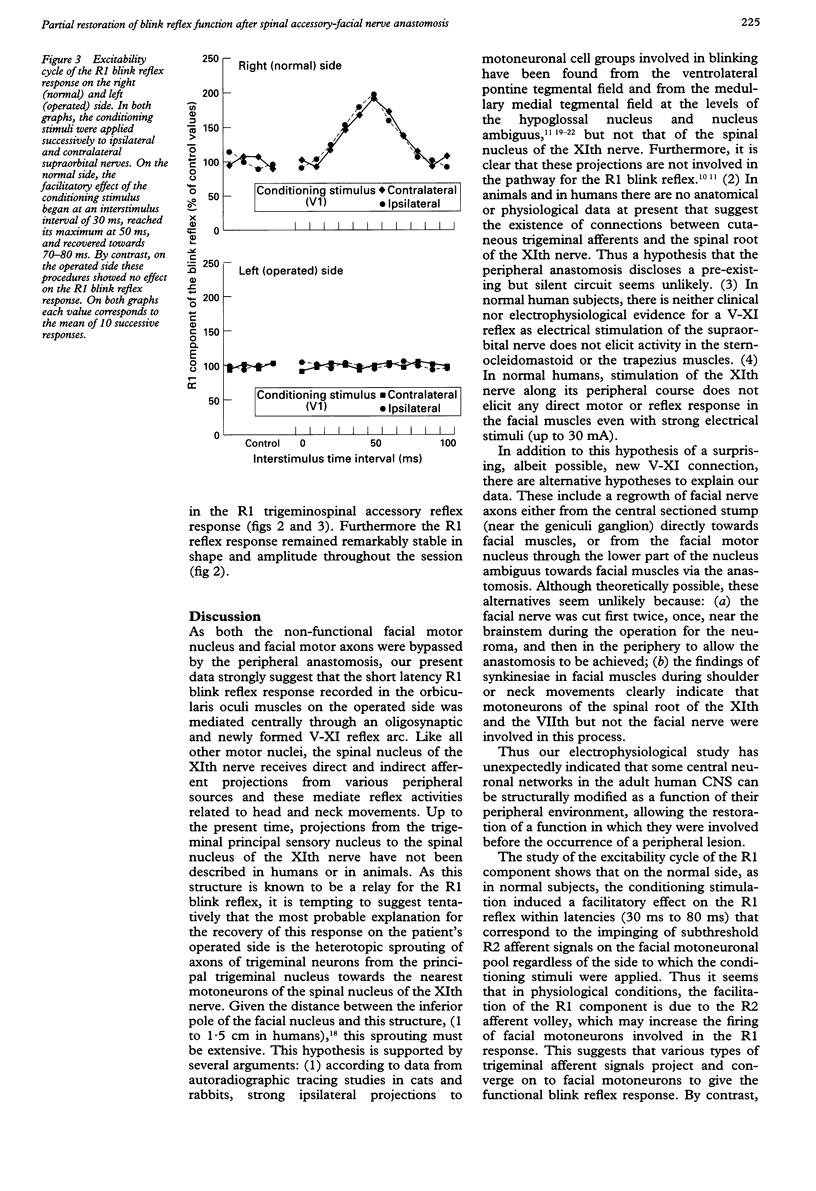
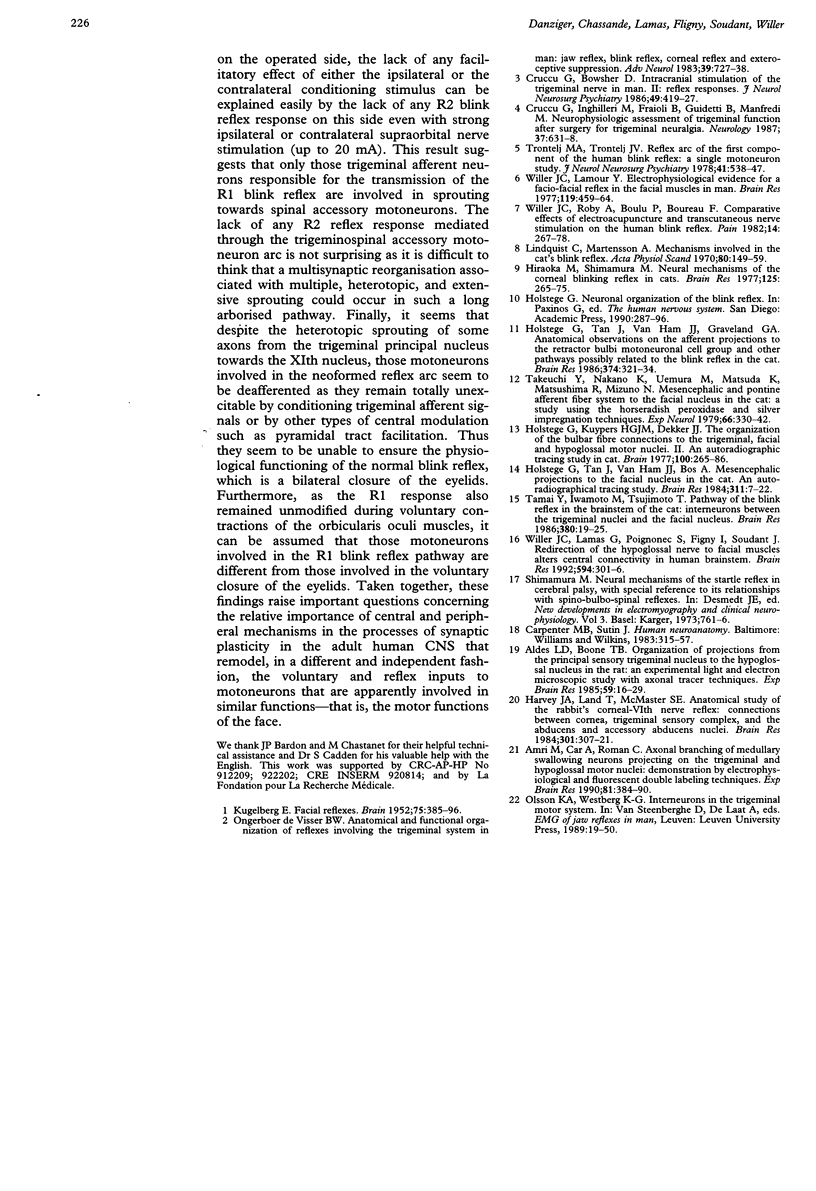
Selected References
These references are in PubMed. This may not be the complete list of references from this article.
- Aldes L. D., Boone T. B. Organization of projections from the principal sensory trigeminal nucleus to the hypoglossal nucleus in the rat: an experimental light and electron microscopic study with axonal tracer techniques. Exp Brain Res. 1985;59(1):16–29. doi: 10.1007/BF00237661. [DOI] [PubMed] [Google Scholar]
- Amri M., Car A., Roman C. Axonal branching of medullary swallowing neurons projecting on the trigeminal and hypoglossal motor nuclei: demonstration by electrophysiological and fluorescent double labeling techniques. Exp Brain Res. 1990;81(2):384–390. doi: 10.1007/BF00228130. [DOI] [PubMed] [Google Scholar]
- Cruccu G., Bowsher D. Intracranial stimulation of the trigeminal nerve in man. II. Reflex responses. J Neurol Neurosurg Psychiatry. 1986 Apr;49(4):419–427. doi: 10.1136/jnnp.49.4.419. [DOI] [PMC free article] [PubMed] [Google Scholar]
- Cruccu G., Inghilleri M., Fraioli B., Guidetti B., Manfredi M. Neurophysiologic assessment of trigeminal function after surgery for trigeminal neuralgia. Neurology. 1987 Apr;37(4):631–638. doi: 10.1212/wnl.37.4.631. [DOI] [PubMed] [Google Scholar]
- Harvey J. A., Land T., McMaster S. E. Anatomical study of the rabbit's corneal-VIth nerve reflex: connections between cornea, trigeminal sensory complex, and the abducens and accessory abducens nuclei. Brain Res. 1984 Jun 3;301(2):307–321. doi: 10.1016/0006-8993(84)91100-4. [DOI] [PubMed] [Google Scholar]
- Hiraoka M., Shimamura M. Neural mechanisms of the corneal blinking reflex in cats. Brain Res. 1977 Apr 15;125(2):265–275. doi: 10.1016/0006-8993(77)90620-5. [DOI] [PubMed] [Google Scholar]
- Holstege G., Tan J., van Ham J. J., Graveland G. A. Anatomical observations on the afferent projections to the retractor bulbi motoneuronal cell group and other pathways possibly related to the blink reflex in the cat. Brain Res. 1986 May 28;374(2):321–334. doi: 10.1016/0006-8993(86)90426-9. [DOI] [PubMed] [Google Scholar]
- Holstege G., Tan J., van Ham J., Bos A. Mesencephalic projections to the facial nucleus in the cat. An autoradiographical tracing study. Brain Res. 1984 Oct 8;311(1):7–22. doi: 10.1016/0006-8993(84)91393-3. [DOI] [PubMed] [Google Scholar]
- KUGELBERG E. [Facial reflexes]. Brain. 1952 Sep;75(3):385–396. doi: 10.1093/brain/75.3.385. [DOI] [PubMed] [Google Scholar]
- Lindquist C., Mårtensson A. Mechanisms involved in the cat's blink reflex. Acta Physiol Scand. 1970 Oct;80(2):149–159. doi: 10.1111/j.1748-1716.1970.tb04780.x. [DOI] [PubMed] [Google Scholar]
- Ongerboer de Visser B. W. Anatomical and functional organization of reflexes involving the trigeminal system in man: jaw reflex, blink reflex, corneal reflex, and exteroceptive suppression. Adv Neurol. 1983;39:727–738. [PubMed] [Google Scholar]
- Takeuchi Y., Nakano K., Uemura M., Matsuda K., Matsushima R., Mizuno N. Mesencephalic and pontine afferent fiber system to the facial neucleus in the cat: a study using the horseradish peroxidase and silver impregnation techniques. Exp Neurol. 1979 Nov;66(2):330–342. doi: 10.1016/0014-4886(79)90084-0. [DOI] [PubMed] [Google Scholar]
- Tamai Y., Iwamoto M., Tsujimoto T. Pathway of the blink reflex in the brainstem of the cat: interneurons between the trigeminal nuclei and the facial nucleus. Brain Res. 1986 Aug 13;380(1):19–25. doi: 10.1016/0006-8993(86)91424-1. [DOI] [PubMed] [Google Scholar]
- Trontelj M. A., Trontelj J. V. Reflex arc of the first component of the human blink reflex: a single motoneurone study. J Neurol Neurosurg Psychiatry. 1978 Jun;41(6):538–547. doi: 10.1136/jnnp.41.6.538. [DOI] [PMC free article] [PubMed] [Google Scholar]
- Willer J. C., Lamas G., Poignonec S., Fligny I., Soudant J. Redirection of the hypoglossal nerve to facial muscles alters central connectivity in human brainstem. Brain Res. 1992 Oct 30;594(2):301–306. doi: 10.1016/0006-8993(92)91139-6. [DOI] [PubMed] [Google Scholar]
- Willer J. C., Lamour Y. Electrophysiological evidence for a facio-facial reflex in the facial muscles in man. Brain Res. 1977 Jan 7;119(2):459–464. doi: 10.1016/0006-8993(77)90325-0. [DOI] [PubMed] [Google Scholar]
- Willer J. C., Roby A., Boulu P., Boureau F. Comparative effects of electroacupuncture and transcutaneous nerve stimulation on the human blink reflex. Pain. 1982 Nov;14(3):267–278. doi: 10.1016/0304-3959(82)90133-6. [DOI] [PubMed] [Google Scholar]


